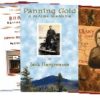In a sense, every blog post on this site is about how to write a book, but in this category, I include blog posts that contribute specifically to answering your questions about how to go about the process of writing—the mechanics of doing so.
You will not find posts on the content of writing: point of view, telling the truth and so much more that is essential to memoir writing at one level but not to this category.
Please look to the specific topic category that will help you with content.
Writing a memoir is not something you can expect to get done in a short while. In fact, it may take you years to write a first draft, research background, revise your text several times, polish it to eliminate verbiage—i.e., make it concise—and render it clear and coherent.
How to write a book can be learned.
There is already much guidance about how to best go about this task. It’s not an easy one, but it is not more difficult than you can accomplish. Many people just like you have written interestng and meaningful memoirs—and you can, too.
Study what has already been done
It’s possible to reinvent the memoir-writing wheel—but that takes much longer than to study models of how to write a book. There are many.
The articles below will provide you with a path to success, but the information and advice has to be applied! Your memoir will not get itself written automatically!
In conclusion
One day, sooner than you may think possible now, you will have a book in hand!
Good luck with your writing.

Monday Focus: Your memoir is not an amoeba: a memoir needs form.
Today is Monday, and it’s a great day to write a bit on your memoir! Your story is not formless; it is not an amoeba. A memoir needs form. You must give your memoir the backbone your readers want and need! Your memoir calls for structure to make as forceful a statement as it can […]

Memoir is Long Form Writing.
One challenge many first-time and only-time writers of memoir face is understanding that long-form and short-form writing are not the same. That is, long form is not just longer short form. Long form has its requirements.
Let me explain how memoir is long form
Many of the writers who come to me for coaching and editing are already fine writers—of short form. They can write coherent and clear sentences and their paragraphs convey meaning. There is no problem with their ability to write short form—the essay or blog post. This may lead them to overestimate their ability to produce long form.
[Free Membership required to read more. See below. ]We'd love to have you access this content. It's in our members-only area, but you're in luck: becoming a member is easy and it's free.
Already a Member?
Not a Member Yet?

How Long Does It Take to Write a Memoir?
Sometimes, years after I’ve heard from someone that he is writing a memoir, I will hear from the writer again. Perhaps it’s three or four or five years later, but the writer is working on the same memoir and is not close to finishing. I don’t get it. How long does it take to write a memoir? So I ask politely, “What has snagged your memoir?” In short…
It seems to have taken that writer too long to write his memoir!
So, how long does it take to write a memoir?
Well, I don’t actually know the answer to “how long does it take to write a memoir?” What I know is a memoir needn’t take so long to compose as many people take. People do get bogged down in writing. A memoir—an interesting and meaningful one under 200 pages—can be written in as short a time as 12 to 24 months.
If that’s so, then why do some memoirs drag on and on and risk never getting completed?
Sometimes, years after I’ve heard from someone that he is writing a memoir, I will connect with the writer again. Perhaps it’s three or four or five years later, but the writer is working on the same memoir. I don’t get it. So I ask politely, “What has snagged the memoir?” In short…
I has taken that writer too long to write his memoir!
How long does it take to write a memoir?
Well, I don’t actually know the answer to “how long does it take to write a memoir?” What I know is a memoir needn’t take so long to compose. A memoir—and interesting and meaningful one—can be written in 12 to 24 months.
If that’s so, then why do some memoirs drag on? [Free Membership required to read more. See below. ]
We'd love to have you access this content. It's in our members-only area, but you're in luck: becoming a member is easy and it's free.
Already a Member?
Not a Member Yet?

Holding the Pen—Writing the Story of My Life
When writing the story of my life, I didn’t let anyone else hold the pen For the past eight months, I have been writing my lifestory. As a professional personal historian, I believe in practicing what I preach to those in my lifestory writing workshops. I have even gone as far as hiring an editor to help me. There is nothing quite like being accountable to another person. I firmly believe that everyone has a story worth telling. I’d like to share with you my motivation and exactly why I decided to get busy preserving my own story.
A valuable resource to remember the past more accurately when writing the story of my life
I possess 523 personal and heartfelt letters that were written over a span of thirty-nine years – precious letters written between my grandmother and myself. My dear grandmother was more like my mother and our relationship was a very close one. As I thought more about writing my lifestory, I wondered “how can I use these insightful letters to help me tell my story.” It seemed to me as if each one of these 523 letters were calling out to me. (Writing the story of my life, I found these proved invaluable.) A great many of the letters were written during the time I lived overseas with my husband, an Information Officer working for the Central Intelligence Agency. Together, we lived in six foreign countries from 1976 through 1992 making eighteen moves during that time. [Free Membership required to read more. See below. ]
We'd love to have you access this content. It's in our members-only area, but you're in luck: becoming a member is easy and it's free.
Already a Member?
Not a Member Yet?

Six Reasons to Join a Long Distance Memoir Writing Program
Many of the biggest challenges facing memoir writers can be alleviated by joining a distance-learning writing program.
Your participation will convince you that you can succeed.
Memoir writers—as all writers—work in isolation. There are many times when a memoir writer would like to have a contact with a system that could help her/him to resolve a writing issue—whether it’s a question of grammar, style, or structure.
If you were not a plumber, would you do the plumbing to your house without first learning as much as you could about plumbing?
Of course, you would want to inform yourself.
You might peruse YouTube, buy some how-to books on plumbing, give a call to a person who is a plumber to ask your questions.
Here’s how you as a new writer can follow the same process to write your first memoir draft. [Free Membership required to read more. See below. ]
We'd love to have you access this content. It's in our members-only area, but you're in luck: becoming a member is easy and it's free.
Already a Member?
Not a Member Yet?

I Finish A Sugary Frosting: Notes on the Memoir Writing Process
Note: This is the 1starticle in a series of 4 on the memoir writing process of A Sugary Frosting published in 2016.
Post 1: I Finish A Sugary Frosting: Notes on the Memoir Writing Process
Post 2: Mechanics of Writing a Memoir: It’s not all Inspiration
Post 3: Preparing for A Successful Book Launch
Post 4: Better Book Production is Possible
Memoir writing can be simple.
It was 2016, and I was in the very last days of the memoir process and polishing A Sugary Frosting / A Memoir of a Girlhood Spent in a Parsonage, the early lifestory of my deceased spouse, Martha Blowen. It was a time to make sure I had written what I wanted to write and to check grammar and spelling before it went out to a copy editor.
I had promised Martha that I would write her stories so that our grandchildren would know something about her. In May 2015, I began gathering the stories she had written of her life. My intent was to create a booklet of these stories. But, to be honest, it has never appealed to me to write booklets. I like to write books. That’s what I do and that’s what I do well.
As I read through Martha’s stories, in a few instances, I understood that some were fragmentary and needed filling out. I knew the story she was trying to convey but then I had lived with her for 31 years. Would someone who did not know her—our grandchildren, for instance—appreciate the tale? So, I tweaked the stories to make them more complete, more meaningful. Good work, I thought. [Free Membership required to read more. See below. ]
We'd love to have you access this content. It's in our members-only area, but you're in luck: becoming a member is easy and it's free.
Already a Member?
Not a Member Yet?

Why You Should—and How to—Write Strategically!
Ought memoir writers to write strategically?
We writers are artists. Most of us cultivate inspiration and are happy when we are under its influence. However, there is no one reading this who is unaware that writing can be pick-and-shovel work and it can be hard going sometimes—there are days when we would rather clean out the garage or the refrigerator than sit down to write. So…why not make the most of our work and learn how to write strategically?
We all love inspiration, but the problem with inspiration is that, while it can make the experience of writing today an excellent one, inspiration does not concern itself with the need we may have to think of our writing in a practical way. For instance, if I have something to say, how can I best approach making my statement available to the largest audience possible or to derive from the writing the best support? Another “for instance” is how can this writing support me financially? (While financial support may seem farfetched to some readers of this blog, it is possible.)
Examples of how to write strategically
[Free Membership required to read more. See below. ]
We'd love to have you access this content. It's in our members-only area, but you're in luck: becoming a member is easy and it's free.
Already a Member?
Not a Member Yet?

Writing a Non-Fiction Book
Writing a non-fiction book is possible!
A common lament, I hear from writers goes like this, “I wanted a book, and I got off to a good start writing a memoir. I’ve always wanted to write a book, but then I just stopped. I don’t know why.”
What I have sometimes found is that people approach memoir-writing as an easy access to becoming “an author.”
“It’s my life after all,” people say. “I ought to know enough about myself to write a memoir without too much of a problem.”
Well, yes and no. It’s clearly your life, but feeling your way through it deeply enough to write about it with any insight, is not a sure thing.
“My own book”—the words convey an excitement and an importance that can be satisfying. And the memoir seemed an entrance, but the fact is that some people may not have the sensibility to write a memoir or may not be ready in their experience of their lives to undertake the project.
A special phrase–“My own book”
[Free Membership required to read more. See below. ]
We'd love to have you access this content. It's in our members-only area, but you're in luck: becoming a member is easy and it's free.
Already a Member?
Not a Member Yet?

Writing Your First Draft: Every Memoir Starts That Way!
Give yourself permission to write a rough first draft. Write pages and pages in which you describe the who, the what, the where and the when of the story. Later, as you rework the piece, the why will be written in.
If you are one of those memoir writers who is not otherwise a writer and who will perhaps never write anything else, know that you need to be kind to yourself. In the Turning Memories Into Memoirs workshops, I am often surprised—and dismayed—at how demanding writers are on themselves at an early stage of the process. There are even times when a writer will not turn in a piece of writing because it was not “good enough”—and that in spite of my having told the group that the writing they would submit would still be in its first draft stage.
Think of the first draft of writing as “fixing” the story in the same way that in days when photographs were fixed by chemicals that stage was important if the image was not to be lost. Your first draft is the stage when you “fix” your story, keep it from being lost rather than make it into a masterpiece.
Don’t reward yourself for being a perfectionist!
[Free Membership required to read more. See below. ]
